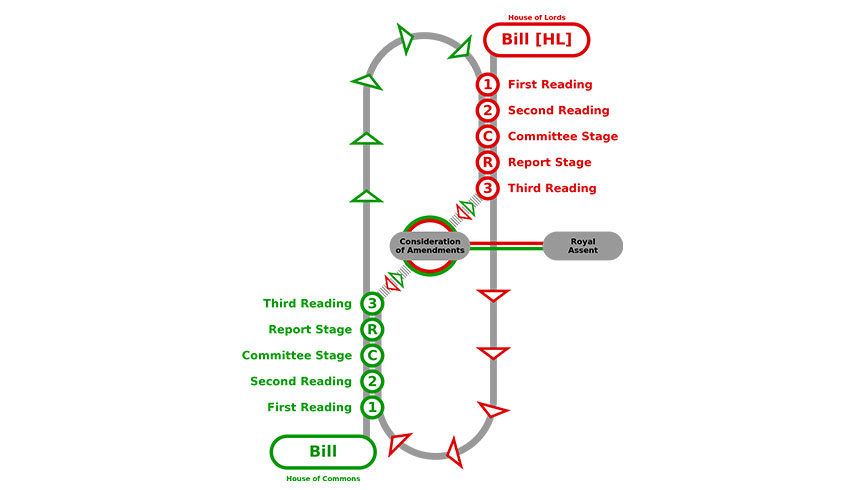How is a Bill passed as an Act in India?
This Article is written by Saumya Bhardwaj of Amity Law School, Delhi
India is a democratic country. A country, which is independent and Sovereign. A country, which is a home of billions of people. A country, which is said to be governed by its own people. This statement brings a fantasy to be true. Hard to believe, isn’t it. But it’s true. It’s time we say, adieu, to fantasy. But how? Do any of us remember sitting on a throne and ruling? No. Then is this all a lie?
It is to be noted that, we, the people of India, do not rule directly. Instead, we appoint our representatives to the legislature. The legislature i.e. the body of public representatives, is responsible in the making of the laws.
Bill:
A draft of a resolution or a legislative proposal is known as a bill. The most vital function of the Parliament is lawmaking, amendment of pre-existing laws and repealing old good-for-nothing laws. To attain any of these purposes, the inaugural step is to present a bill in both the houses of the parliament. Article 107 of the Indian Constitution provides the provisions as to introduction and passing of bills.
A bill can be introduced by a minister or by any member of the parliament. When a bill is introduced in the house by a minister, it is said to be a Government Bill and when it is introduced by any member other than the minister, it is said to be a Private Member Bill.
A non-money bill can be introduced in any of the houses i.e. the Lok Sabha or the Rajya Sabha but the introduction of the money bill restricts itself to the Lok Sabha. Article 109 of the Indian Constitution lays down special procedures in respect of money bills.
For a bill to pass, it needs to pass through three stages. As each stage involves reading of the bill, therefore , it is known as the first reading, second reading and the third reading.
First Reading:
A bill (Except Money Bill) is independent to be introduced by any member of the parliament in any house provided that he or she is the member of the same house. It is on the part of the mover of the bill to ask for the leave of the house to introduce the bill. Only when the leave is granted, a bill can be introduced. Then, the mover of the bill present the idea or the motion of introduction to the bill.
As this stage involves only introduction to the bill, it is usually bereft of all oppositions and allegations. But, if the bill is opposed in this stage, the mover as well as the oppose is obligated to make brief statements on the floor of the house (It is to be noted that the motion of the introduction of a Finance Bill or an Appropriation Bill is never opposed). This is followed by a vote. This stage is known as the first reading.
Once the bill is cleared in this stage, the bill is sent for publication in the Gazette of India by the Speaker (or Chairman) of the House. Sometimes, in case of important bills, before introduction in the house, the bill gets published.
Second Reading:
The second reading is considered to be the most essential stage of lawmaking in the Parliament. This stage offer several options:-
- It may move straight to the house for further consideration
- It may get referred to a selected committee nominated by the house
- It may get forwarded to the Joint Committee of both the houses
- It may get circulated for public opinion
Mostly, a bill is referred to the selected committee. This varies for different bill taking into account urgency of the matter.
Committee Stage: On the basis of the knowledge of the members, a Select Committee or a Joint Committee is set up. This committee includes both, the members in favour of the motion and the members opposing it. In a Joint Committee, 2/3 members are from Lok Sabha and the remaining 1/3 are the members from the Rajya Sabha.
Report: A report is prepared by the committee that can be an unanimous report or a report of majority opinion. In case of a Majority Opinion report, the minority opinion members are permitted or allowed to give the “Minutes of Dissent” in the report. This report then undergoes a “clause to clause” discussion by the House and amendments or necessary reconsiderations are moved according to the discussion. This marks the most essential and time consuming moment in the lawmaking process. Thus, this stage refines the bill’s subject matter and give it a proper shape.
Third Reading:
This stage of reading prohibits amendments, although the members are allowed to discuss the basic characteristics of the bill. The bill is now moved to a vote. This stage can also be referred to as a voting stage. A majority i.e. 50% and above, is sufficient to pass a bill (A constitutional bill requires a majority of 2/3 votes to pass).
Other House:
Once, a bill is passed in the first house, it is send to the other house. A similar procedure of readings is followed in the other house as well. This house can decide the fate of the bill in three ways i.e.
- It can pass the bill like the originating house
- It can amend it
- It can simply reject it
In case of option number 2 and 3, the bill is returned back to the originating house. If the second house does not return the bill to the originating house for six months it is deemed to be rejected. On the return of the bill to the originating house, the amendments suggested by the other house are taken into consideration. If the suggested amendments are not accepted by the originating committee, a joint sitting of both the houses is called upon and the decision is taken by the majority of votes.
President’s Consent:
After the recognition of both the Houses, the bill is sent for the President’s assent as per Article 111 of the Indian Constitution. He can do two things:-
- He can give his assent to the bill
- He may send the bill back to the originating House for reconsideration
If the bill is again passed by both the houses, the President is bound to give his consent. Once, the president’s assent is confirmed, the bill is published in the Official Gazette of India.
Conclusion:
Once a bill is passed through the legislative procedure, it is known as an act or statute. This act becomes the law of the land. In this way, we, the people of India, with the help of the Members of the Parliament frame our laws.
Picture Courtesy: Wikimedia







